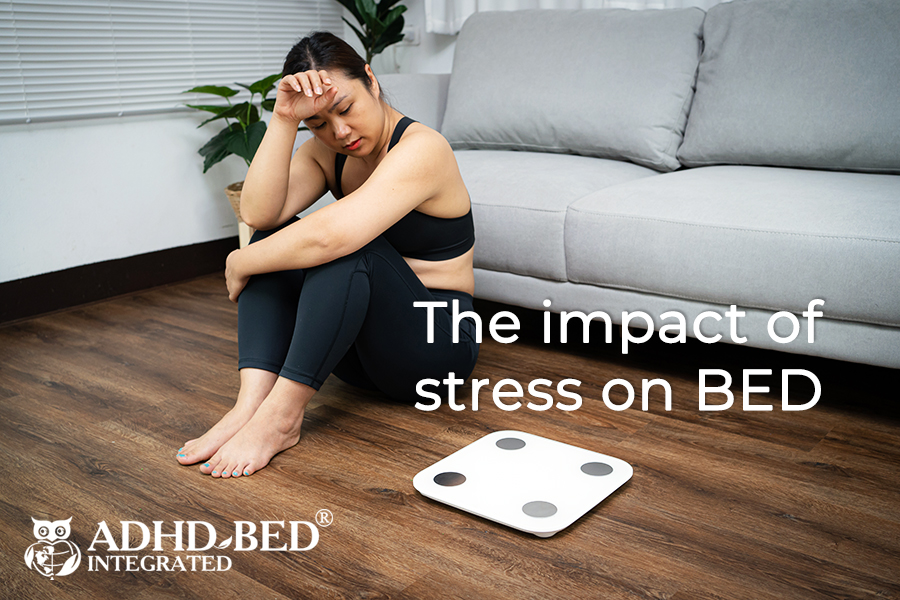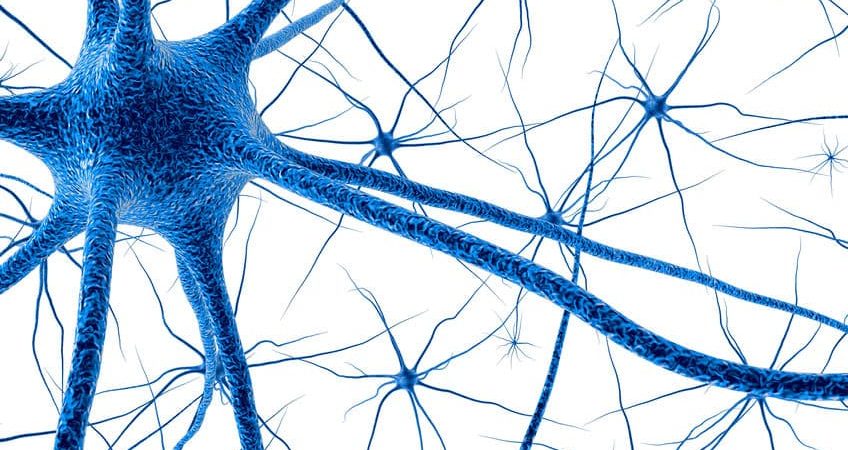Table of Contents
Introduction
Binge Eating Disorder (BED) is the most commonly diagnosed eating disorder, affecting around 2 to 3% of the population. It is a serious psychiatric disorder involving recurrent periods of binge-eating, that are characterised by trance-like episodes of consuming abnormally excessive amounts of food. BED also involves psychological features like a deep sense of guilt or shame and feeling a lack of control over their behaviour during a binge-eating episode. For patients with BED, this can lead to high levels of psychological distress. If BED is untreated, there can be detrimental consequences to a patient’s physical health and psychological wellbeing.
Stress is associated with BED as a key inducing and maintaining factor to binge-eating. Symptoms of BED can manifest in a cycle of stress-eating where patients use food as a coping mechanism for managing stress in their lives, which then develops into deep feelings of shame or guilt, and thus further perpetuate disordered eating behaviours like bingeing as a way to cope. Evidently, understanding the relationship between stress and BED can provide insight towards how patients and their providers can work around their binge triggers and reduce their binge-eating behaviours through the use of stress reduction techniques.
This article will describe the link between stress and BED, outline the various stress reduction techniques that can be used to treat symptoms of BED and how these techniques can be implemented in a patient’s treatment plan for recovery.
The Link Between Stress and Binge Eating Disorder
The association between stress and BED can be depicted as a cycle of stress-induced eating and eating-induced stress. In this cycle, patients of BED tend to turn to stress-eating as a way to cope with psychological distress from stressful events in their lives. Stress-eating, or emotional-eating, occurs when an individual resorts to food as a way to feel comfort or relief during negative emotional states. If the stress-eating becomes clinically significant and can be classified as abnormally frequent and excessive, it is considered a binge-eating episode. During or after the binge-eating episode, patients of BED will feel an immense guilt or shame over their behaviour and feel embarrassed over the loss of control while eating. This leads to high levels of psychological distress, which can feed into the cycle of more stress/emotional-eating.
Can Stress Lead to Binge-Eating?
Yes. Research evidence investigating stress-induced eating behaviours has shown that acute stress, which provokes elevated anxiety levels, is associated with higher amounts of food consumption. Furthermore, a recent review of the current evidence on stress and BED concluded that eating behaviours during periods of stress was generally higher in amount of food intake and faster in the rate of consumption.
The Neurobiology Behind Stress and Eating
It is not uncommon for people to feel like eating when they are stressed. The reason behind this can be attributed to the overlapping neurobiological pathways responsible for how our bodies respond to stress, reward and food regulation.
When our bodies recognise that an acute threat or stressor is present, it goes into fight-or-flight mode and sets off a chain reaction of physiological responses. These can include the release of stress hormones and increases in heart rate and blood pressure.
Cortisol, also known as the stress hormone, is released by the body to effectively manage stress through reducing blood pressure and increasing glucose levels in the bloodstream to be absorbed by the brain. Cortisol has been linked to the regulation of appetite and food intake, and also plays a role in the stimultion of our bodies’ reward system. This means that when cortisol is released due to stress, it transmits a signal to both pathways responsible for appetite regulation and reward processing. This overlap reinforces the link between eating and reward, especially when triggered by stress. If a person is particularly vulnerable towards stressful events, the impulsive need to stress eat is maintained. This theory is supported in evidence demonstrating that cortisol levels tend to be higher in patients with binge-eating tedencies.
The Influence of Stress on Binge Eating Disorder
For patients of BED, stress can impact the presentation of binge-eating symptoms and lead to unfavourable outcomes. Stress is associated with increased frequency and severity of binge eating episodes. For example, patients who tend to experience higher levels of stress are more prone to experience binge-eating tendencies or disordered eating behaviours.
Undoubtedly, stress-induced binge-eating has emotional and psychological consequences towards a person’s wellbeing. If an individual with BED is faced with stressful triggers, this can lead to a binge-eating episode which is associated with intense emotions of guilt and shame. In BED, where binge-eating episodes are frequent, patients are likely to develop poor self esteem and are at risk for developing psychological comorbidities like anxiety or depression.
If stress is not reduced over time, this can negatively effect treatment outcomes and long-term development of BED. As such, recurrent exposures to stress are typically targeted by clinicians in treatment and patients are guided on how they may avoid stressors and develop coping strategies to deal with stress.
Stress Reduction Techniques for Managing Binge Eating Disorder
Cognitive-Behavioural Techniques for Stress Reduction
Cognitive Behavioural Therapy (CBT) is a treatment that aims to target symptoms of a disorder by reconstructing a person’s maladaptive beliefs and modifying patterns of harmful behaviours through critical self-evaluation and problem-solving strategies. Through CBT, cognitive-behavioural techniques can be used to manage and reduce stress.
CBT for BED can promote stress reduction through the use of strategic techniques like identifying negative beliefs that may be triggered by stress, recognising the harmful nature of using food to cope with stress and establishing positive coping strategies with specific behavioural goals to reduce binge-eating.
Mindfulness-Based Interventions for Stress Reduction
Mindfulness-based interventions have been used by clinicians to help patients of BED manage stress levels, regulate emotions and learn how to cultivate acceptance and compassion towards oneself. Mindfulness practice can be done through activities like yoga, meditation and self-affirmations, or even through mindful eating, which involves paying attention to food with purpose and without judgment when eating. This can help patients move away from the tendency for compulsive eating and practice self-compassion.
Physical Activity and Exercise as Stress Reducers in BED
Physical activity and exercise are often recommended as a lifestyle change to make in the recovery journey for BED. When combined with other treatment methods like medication or psychotherapy, physical exercise can aid in improvment of treatment efficacy. Studies have found that physical activity is associated with decreased levels of anxiety sensitivity, emotional distress and body dissatisfaction. Thus, physical activity and exercise are recommended as preventative and therapeutic measures for BED symptoms and stress reduction.
The Role of Stress Reduction Techniques in Improving Treatment Outcomes
Cognitive-behavioural techniques, mindfulness-based interventions and physical acitivity all play a role in stress reduction for BED patients. Not only do these techniques for stress reduction help patients manage the way they cope with stress, but they also improve treatment outcomes through reducing the frequency and severity of binge-eating episodes, improving psychological wellbeing, improving quality of life and maintaining these positive outcomes long-term.
Practical Applications and Recommendations
To maximise treatment outcomes, it is highly recommended that patients of BED actively integrate the stress reduction techniques into their existing approaches to BED treatment.
Patients are also encouraged to engage with their doctors to create individualised treatment plans that implement personalised stress reduction strategies based on their goals and needs.
In implementing the stress reduction techniques alongside existing treatment approaches, it is common for different healthcare professionals to collaborate on an individual patient’s treatment plan to maximise the efficacy of treatment outcomes. For example, it is a general practitioner managing medications for a patient may refer them to a psychologist for mindfulness-based or cognitive-behavioural tehcniques to help manage stress.
Conclusion
To conclude, it is known that stress plays a role in the development of disordered eating behaviours like binge-eating. Stress eating or emotional eating are underpinned by neurobiological and psychological mechanisms that reinforce binge-eating tendencies when stress levels are not reduced. Various stress-reduction techniques can be used, like cognitive-behavioural techniques, mindfulness-based interventions and physical exercise. When implemented together with typical treatment approaches to BED, treatment outcomes can be maximised and preserved.
References
American Psychiatric Association. (2022). Diagnostic and statistical manual of mental disorders (5th ed., text rev.). doi.org/10.1176/appi.books.9780890425787
Hilbert, A. (2018). Binge-Eating Disorder. Psychiatric Clinics of North America. doi:10.1016/j.psc.2018.10.011
Giel, K. E., Bulik, C. M., Fernandez-Aranda, F., Hay, P., Keski-Rahkonen, A., Schag, K., … & Zipfel, S. (2022). Binge eating disorder. Nature Reviews Disease Primers, 8(1), 16. https://doi.org/10.1038/s41572-022-00344-y
Smith, K. E., Mason, T. B., Schaefer, L. M., Anderson, L. M., Critchley, K., Crosby, R. D., … & Peterson, C. B. (2021). Dynamic stress responses and real-time symptoms in binge-eating disorder. Annals of Behavioral Medicine, 55(8), 758-768. https://doi.org/10.1093/abm/kaaa061
Naish, K. R., Laliberte, M., MacKillop, J., & Balodis, I. M. (2019). Systematic review of the effects of acute stress in binge eating disorder. European Journal of Neuroscience, 50(3), 2415-2429. https://doi.org/10.1111/ejn.14110
Adam, T. C., & Epel, E. S. (2007). Stress, eating and the reward system. Physiology & behavior, 91(4), 449-458. http://dx.doi.org/10.1016/j.physbeh.2007.04.011
Rosenberg, N., Bloch, M., Avi, I. B., Rouach, V., Schreiber, S., Stern, N., & Greenman, Y. (2013). Cortisol response and desire to binge following psychological stress: comparison between obese subjects with and without binge eating disorder. Psychiatry Research, 208(2), 156-161. https://doi.org/10.1016/j.psychres.2012.09.050
Sysko, R., Devlin, M. J., Yager, J., & Solomon, D. (2023). Binge eating disorder: Cognitive-behavioral therapy (CBT). UpToDate. Waltham, MA: UpToDate. Retrieved from https://www.uptodate.com/contents/binge-eating-disorder-cognitive-behavioral-therapy-cbt
Nelson, J. B. (2017). Mindful Eating: The Art of Presence While You Eat. Diabetes Spectrum, 30(3), 171–174. https://doi.org/10.2337/ds17-0015
Blanchet, C., Mathieu, M. È., St-Laurent, A., Fecteau, S., St-Amour, N., & Drapeau, V. (2018). A Systematic Review of Physical Activity Interventions in Individuals with Binge Eating Disorders. Current obesity reports, 7(1), 76–88. https://doi.org/10.1007/s13679-018-0295-x
DeBoer, L. B., Tart, C. D., Presnell, K. E., Powers, M. B., Baldwin, A. S., & Smits, J. A. (2012). Physical activity as a moderator of the association between anxiety sensitivity and binge eating. Eating behaviors, 13(3), 194-201. https://doi.org/10.1016/j.eatbeh.2012.01.009



